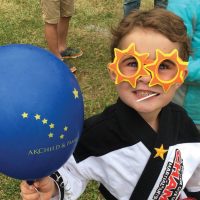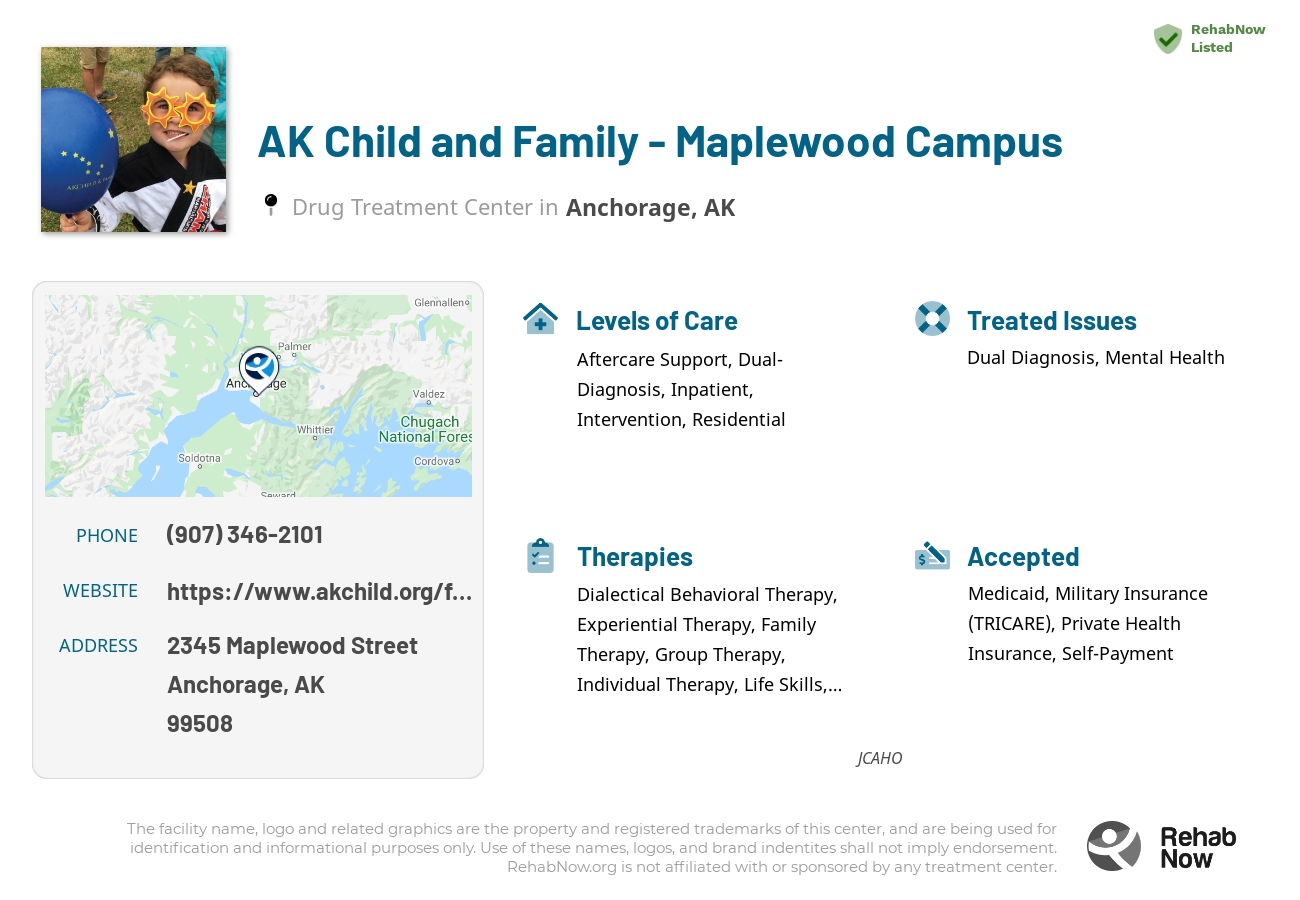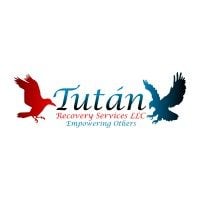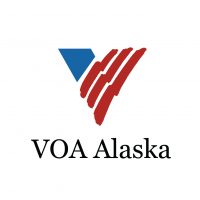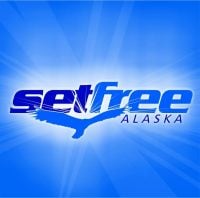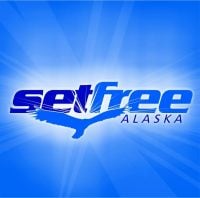AK Child and Family - Maplewood Campus
Drug Rehab Center in Anchorage, Alaska
AK Child and Family - Maplewood Campus is an addiction treatment facility providing inpatient services, evidence-based therapeutic modalities, holistic treatment approaches, and family-focused addiction treatment and education programs, as well as aftercare support, special programs, and adhering to the highest standards of ethical care.
Multiple patients have reported AK Child and Family - Maplewood Campus as permanently closed.
Research other rehabs in Anchorage, Alaska, or get help finding an open facility.
About AK Child and Family - Maplewood Campus in Alaska
AK Child and Family - Maplewood Campus in Anchorage, AK, specializes in turning around the lives of young individuals through comprehensive mental health services. With a capacity of 18 beds, the campus shines through its dedication to treating those with dual diagnoses, implementing community-based programs, and fostering a supportive environment for its residents. The facility is a beacon of hope, offering structured care and expert guidance.
Accredited by the Joint Commission on Accreditation of Healthcare Organizations (JCAHO), AK Child and Family - Maplewood Campus emphasizes quality and safety in all their services. Patients here benefit from a blend of residential psychiatric treatment and community programs, specifically designed to cater to the unique struggles faced by young people on their journey towards recovery.
- Specialized Dual Diagnosis Treatment: Tailored programs address both mental health and substance abuse issues, providing a holistic approach to recovery.
- Comprehensive Aftercare Support: Ensuring a smoother transition to everyday life, the facility offers extensive post-treatment services.
- Evidence-Based Therapies: Including medication-assisted treatment, cognitive behavioral therapy, and 12-step programs, catered to foster lasting change.
Catering to a variety of issues including substance abuse and mental health conditions, AK Child and Family - Maplewood Campus employs a multifaceted approach to treatment. Strategies such as individual and group therapy, alongside innovative care levels, facilitate a path to sober living underpinned by a supportive community and structured aftercare.
Genders
Ages
Modality
Additional
Accreditations

JCAHO
Conditions and Issues Treated
Levels of Care Offered
This center offers a variety of custom treatment tailored to individual recovery. Currently available are Aftercare Support, Dual-Diagnosis, Inpatient, Intervention, Residential, with additional therapies available as listed below.
Inpatient treatment for alcoholism or drug addiction is an option that provides the addict with a supportive environment in which they can stop using. This type of treatment is appropriate for addicts that are most in need of intensive care and supervision. This includes those who were unable to quit on their own, those who need more structure than they can get in outpatient treatment.
Residential treatment programs are those that offer housing and meals in addition to substance abuse treatment. Rehab facilities that offer residential treatment allow patients to focus solely on recovery, in an environment totally separate from their lives. Some rehab centers specialize in short-term residential treatment (a few days to a week or two), while others solely provide treatment on a long-term basis (several weeks to months). Some offer both, and tailor treatment to the patient’s individual requirements.
Drug rehab intervention aims to make sure patients understand the risks of their addiction and possible outcomes. They must learn how their addiction affects those around them and allow a therapy session to help move past the physical symptoms. They often include psychotherapy or behavioral therapy, group therapy, family counseling, and peer support.
Aftercare support is vital to those who have completed a drug or alcohol treatment program. This support comes in individual and family counseling, treatment of psychiatric and other medical conditions, and medications to reduce cravings. It helps recovering addicts adjust to normal day-to-day activities and can last for a year or longer.
The majority of drug and alcohol addicts who receive aftercare treatment do not relapse. It is estimated that without aftercare, the relapse rate will be between 70 to 90 percent for most people. Aftercare is the final stage in addiction recovery, but it will also help maintain sobriety if relapse does occur.
Therapies & Programs
No single treatment works for all addicts; therefore, the goal of treatment and therapy should be to find what works best for each individual. Some people requiring addiction treatment may only need a few weeks of inpatient care. Others will require long-term residential care. Tolerance and withdrawal levels vary from person to person and thus affect the intensity of the treatment needed.
If an individualized approach to treatment and therapy is not offered, addicts may fail to reap benefits from their efforts. Professionals must customize plans according to their patient’s needs, limitations, and strengths. The goal of all forms of addiction treatment should be for addicts to find healthy ways to cope with their addiction and its underlying causes.
The therapies usually include siblings, children, and parents who are involved in their daily lives. These sessions are vital because they address past issues that may have hampered an addict’s or alcoholic’s recovery and provide support at a crucial time!
One of the most critical aspects of family therapy is helping addicts’ loved ones see their situation in a new light. It’s also one of the most challenging things a family can do when a loved one struggles with addiction or alcoholism.
Group therapy is held in a safe, controlled setting where patients can feel comfortable sharing their struggles and gaining perspective through shared conversations. It takes place in a group rather than one on one to prevent feelings of isolation or being unique in their situation while creating an environment for addicts at AK Child and Family - Maplewood Campus to develop fellowship, accountability, and support. Group therapy is an important tool in recovery that prevents cravings that prompt a return to active addiction.
This type of therapy involves the use of a variety of therapeutic techniques to help addicts recover from past traumas that might have triggered their substance abuse. During these sessions, therapists will work with the addict to address painful memories and learn how to cope effectively with stressors as they arise.
During these types of sessions, therapists will typically focus on three main goals:
- Identifying and expressing painful emotions associated with past traumas.
- Reducing the effects of stress on an addict’s life by developing more effective coping mechanisms.
- Developing healthy ways of thinking about stressful situations that can help addicts avoid substance abuse issues in the future.
This type of therapy is typically used in conjunction with other types of addiction treatment services. By identifying and dealing with the root cause of addiction, most addicts can overcome their cravings and prevent relapse once they leave rehab.
Many different types of addiction treatment services exist to help addicts safely get sober, but it’s important for recovering individuals to find a therapist or support group that will help them address the root cause of their addiction.
Dialectical Behavior Therapy is a form of Cognitive Behavioral Therapy that helps patients understand the relationship between their thoughts, feelings, and behaviors. It is beneficial for those whose addictions and behaviors stem from severe mental health issues. It aims to help the patient achieve their goals and identify how they can enhance their lives.
Cognitive-behavioral therapy is a talking-based method that helps people struggling with addiction replace destructive behaviors with healthier ones. CBT also helps them identify the underlying thoughts and beliefs that cause these behaviors in the first place and ways to control those thoughts and feelings. It can be administered as a holistic therapy or as part of combination therapy and—as opposed to turning to drugs and alcohol—helps addicts learn how to respond to negative thoughts instead.
Life skills training is beneficial for addicts in recovery because it helps them learn how to take care of themselves and improve their quality of life, which can promote feelings of purpose and motivation.
This type of treatment works by teaching individuals life-enhancing skills that support positive living, including:
- Healthy lifestyle habits
- Skills to effectively manage stress
- Effective communication skills to help them get their needs met without turning to drugs or alcohol
- Money management and budgeting skills so they can continue to take care of themselves after treatment ends.
When you leave a healthy lifestyle behind to live as an addict, your body becomes unbalanced. Nutritional deficiencies gradually creep in, and before you know it, you’re facing severe health problems. For people who are trying to kick their drug addiction, nutrition therapy at AK Child and Family - Maplewood Campus is a great tool. It helps restore balance to the body, and for many addicts, it represents the first step on the road to recovery.
Nicotine replacement therapy is a way for people to get the nicotine they are addicted to without having to smoke cigarettes. There are several different types of devices that have been approved for NRT. Studies have shown that all NRTs work better than placebo (fake treatment). NRT helps smokers get nicotine into their system without resorting to smoking and experiencing aggressive withdrawal symptoms. Coupling NRT with counseling and other means of support gives long-term smokers a better chance of removing their unhealthy habit.
Patient Experience
Experiential Therapy at AK Child and Family - Maplewood Campus
Experiential Therapy is used by drug treatment facilities to treat substance abuse. This treatment is clinically proven to help addicts in detoxification by allowing them to release emotions in a safe environment. The treatment process involves addicts painting their feelings and releasing them on a canvas.
One of the most popular forms of experiential therapy is known as LPE – Love, Peace, and Equilibrium. Amy Gumowitz developed this treatment in 1992. By implementing her philosophy of “reality therapy” into the treatment, Gumowitz’s results were outstanding. Once her success was validated by those she had been helping, she decided to open her treatment center. Although Gumowitz passed away in 2007, her contribution to the addiction recovery remains effective, and better yet, it is 100% self-sufficient.
Payment Options Accepted
For specific insurance or payment methods please contact us.
Is your insurance accepted?
Ask an expert, call (888) 674-0062
AK Child and Family Associated Centers
Discover treatment facilities under the same provider.
- AK Child and Family - Maley Center in Anchorage, AK
- AK Child and Family - Jesse Lee Campus in Anchorage, AK
Learn More About AK Child and Family Centers
Additional Details
Specifics, location, and helpful extra information.
Anchorage, Alaska 99508 Phone Number(907) 346-2101 Meta DetailsUpdated April 15, 2024
Staff Verified
AK Child and Family - Maplewood Campus Patient Reviews
There are no reviews yet. Be the first one to write one.
Anchorage, Alaska Addiction Information
Alaska is enduring a multi-faceted drug and alcohol abuse problem. Heroin-related overdoses are 50% higher in Alaska than in the rest of the United States. Methamphetamine use is a major contributing factor to violent crime in Alaska. More than 60,000 Alaskans need some sort of treatment for substance abuse and/or addiction.
9,500 people struggle with addiction to drugs or alcohol in Anchorage. The city has been hit hard by the opioid epidemic. The most commonly abused drugs include marijuana, cocaine, methamphetamine, and prescription drugs. Between 2012 and 2016, there was a 64% increase in the number of deaths due to drug overdoses. Several treatments are available in Anchorage. Participants receive around-the-clock care and supervision; they also have access to a variety of therapy.
Treatment in Nearby Cities
- Soldotna, AK (63.9 mi.)
- Petersburg, AK (671.1 mi.)
- Anchorage, AK (2.3 mi.)
- North Pole, AK (258.2 mi.)
- Wrangell, AK (702.6 mi.)
Centers near AK Child and Family - Maplewood Campus
The facility name, logo and brand are the property and registered trademarks of AK Child and Family - Maplewood Campus, and are being used for identification and informational purposes only. Use of these names, logos and brands shall not imply endorsement. RehabNow.org is not affiliated with or sponsored by AK Child and Family - Maplewood Campus.
